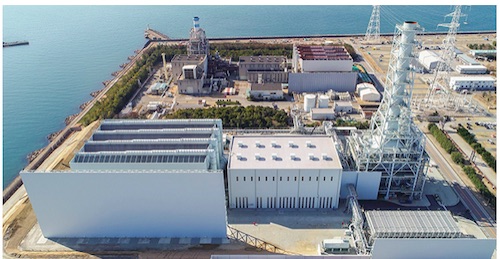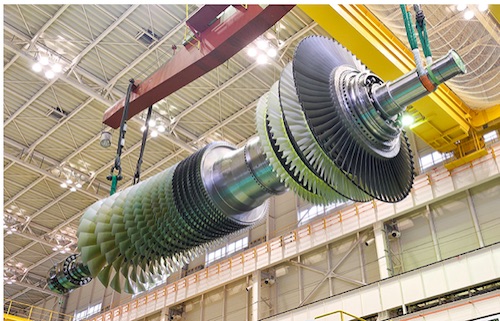|
MHPS: World's Most Efficient Power Plant is Synced to the Grid and Operating at Full Load, Ahead of Schedule
- T-Point 2 Validation Facility Features the Enhanced JAC Power Train -
- Facility will validate the performance and reliability of the 1650degC-class JAC gas turbine, the most efficient heavy-duty gas turbine in the market
- Poised to become the world's first autonomous combined cycle power plant featuring MHPS-TOMONI suite of intelligent digital solutions
YOKOHAMA, Japan, Apr 02, 2020 - (JCN Newswire) - Mitsubishi Hitachi Power Systems, Ltd. (MHPS) has begun commissioning of T-Point 2, its new combined cycle power plant validation facility at Takasago Works in Hyogo Prefecture, Japan. Replacing the iconic T-Point, the facility will accelerate MHPS' industry-leading technology and enable more robust validation of advanced-class gas turbines (ACGTs) such as the 1650degC-class JAC model and 1700degC-class ultrahigh-temperature models. Like its predecessor, T-Point 2 stands apart as the only facility in the world that performs full-scale long-term reliability verification for gas turbines. Connected to the actual grid, it is the only plant of its type in the world to function as both a technology demonstrator and an electric power producer and supplier. Also housed within Takasago Works are centers for R&D, design, manufacturing, and short-term component testing.
 | | T-Point 2 (Front side: T-Point 2, Back side: T-Point) |
 | | M501JAC Gas Turbine Rotor |
"Through the years, we have proven our ability to develop and manufacture the most cutting-edge solutions for the power generation industry," said Mr. Ken Kawai, President and CEO, MHPS. "Building on the legacy of the original T-Point, T-Point 2 will enable us to widen our footprint as the preferred solutions partner to meet ever-changing power generation requirements around the world."
Engineering the next generation of gas turbines
Once commercial operations begin in July 2020, T-Point 2 is expected to achieve power output of over 566 MW (60Hz), with nearly 64% efficiency, 99.5% reliability and a world-first turbine inlet temperature of 1650degC - raising industry standards for gas turbine combined cycle performance globally. This improved performance is possible due to the advanced engineering of the upgraded J-Series Air-Cooled (JAC) model, which is the first gas turbine being validated at T-Point 2.
The new facility features a triple-casing steam turbine, augmenting overall system efficiency through a multiplier effect with the JAC gas turbine. This greater efficiency reduces carbon emissions and heat loss, significantly reducing the environmental impact of T-Point 2.
"The prototype validation system established by MHPS has given our customers the clear assurance that they are receiving the highest caliber and most reliable energy solutions in the market," said Mr. Junichiro Masada, Senior Vice President and Senior General Manager of Gas Turbine Technology & Products Integration Division, MHPS. "The launch of T-Point 2 is testament to MHPS' commitment to deliver industry-leading power generation technology and customer service underpinned by best-in-class methods for performance and durability verification."
MHPS will use the facility to conduct validation of the next-generation 1700degC-class ultrahigh-temperature gas turbines, steam turbine upgrades, air-cooled condenser technology, generators, and static frequency converters.
Bringing power generation to the digital age
Work is underway to install and train advanced artificial intelligence technology at T-Point 2, which will feature the MHPS-TOMONI suite of digital solutions. During the 8,000 hour durability demonstration period, MHPS will also be training its AI apps, allowing T-Point 2 to eventually become the world's first autonomous combined cycle power plant. This will catapult power generation into a future where digital technologies are fully integrated into plant operations, allowing plant owners to leverage data to optimize performance, enable condition-based predictive maintenance for equipment, selectively automate operation and maintenance (O&M) decision-making, and reduce risk.
With these building blocks, MHPS will remotely monitor and manage total plant performance; remotely operate the plant in coordination with grid and fleet-wide energy management objectives; and utilize sensor and control system data to make smarter operation decisions in real time. MHPS-TOMONI solutions powered by advanced technologies such as artificial intelligence and machine learning will enable MHPS to automate O&M decision-making to maximize the profitability of existing and future GTCC plants.
Source: Mitsubishi Power
Sectors: Energy, Alternatives
Copyright ©2025 JCN Newswire. All rights reserved. A division of Japan Corporate News Network. |